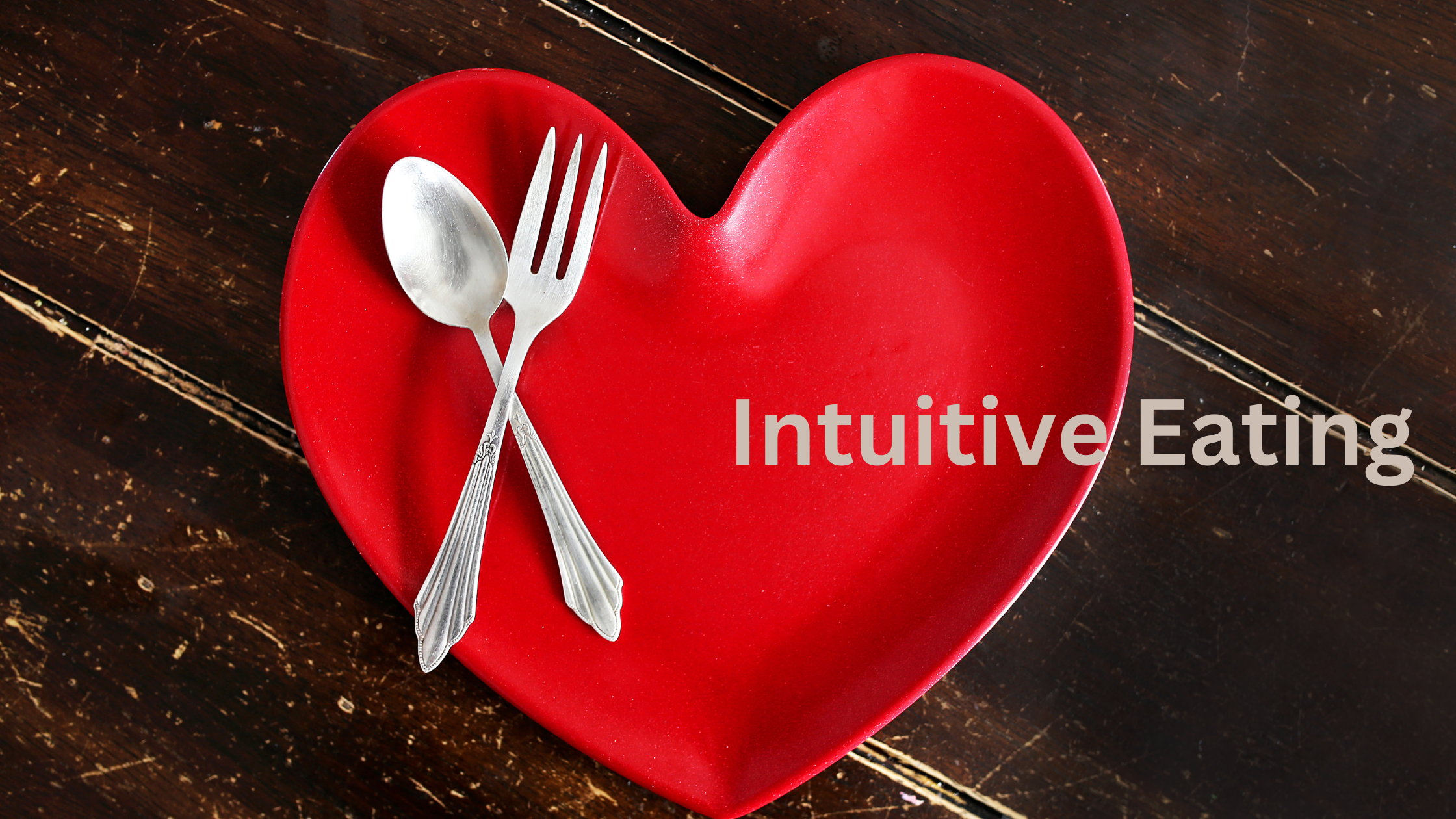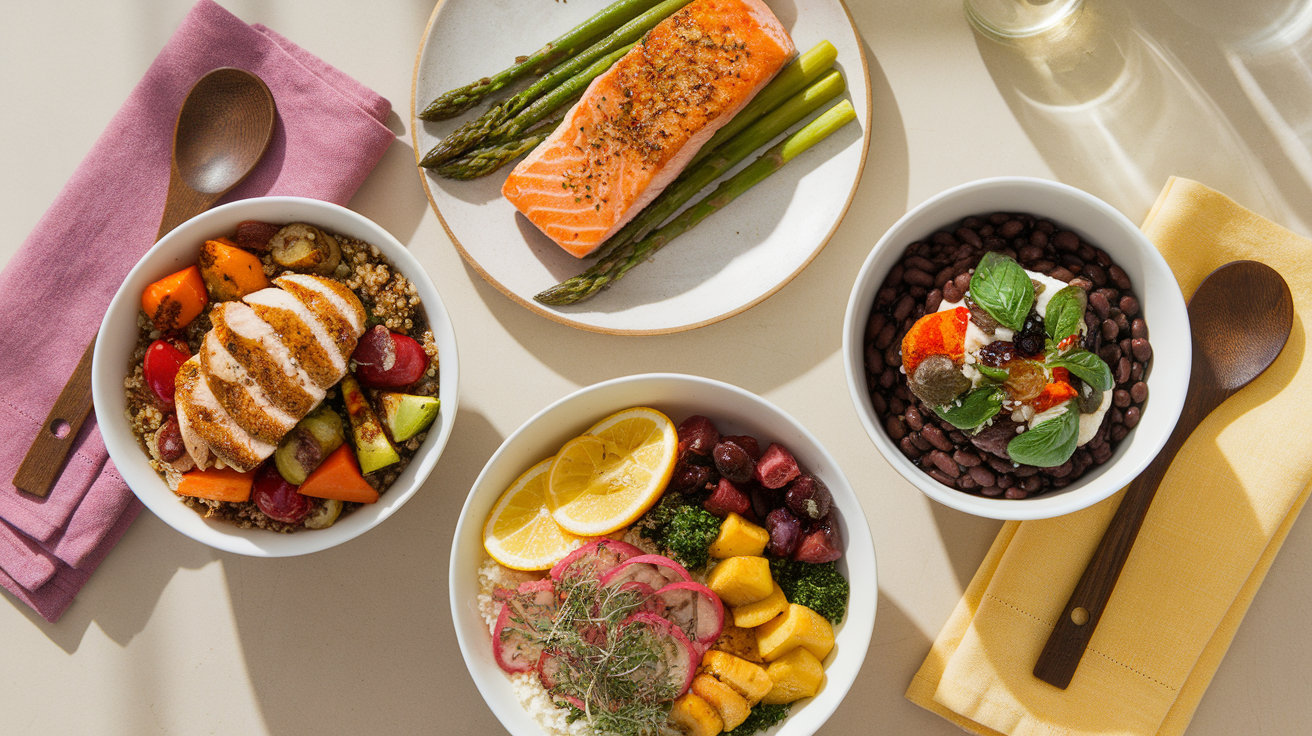Intuitive Eating: An Easy Guide to Nourishing Your Body and Mind Introduction
Hey there, friend! Have you ever felt lost in the world of diets and nutrition advice, where one size fits all? Well, I’ve got something refreshing to share with you, something that’s not just another diet trend but a journey back to the basics of listening to and loving your body. It’s called Intuitive Eating, and trust me, it’s as liberating as it sounds.
Table of Contents
ToggleIntuitive Eating (IE) is like a breath of fresh air in a world where diet culture often leaves us feeling confused and dissatisfied. Created in 1995 by dietitians Elyse Resche and Evelyn Tribole, this approach is a game-changer. It’s not about restricting yourself, counting calories, or following rigid meal plans. Instead, it’s about tuning into your body’s own cues, eating when you’re hungry, stopping when you’re full, and enjoying food without guilt. Think of it as relearning the art of eating like when we were kids – simple, joyful, and instinctive.
But here’s the deal – intuitive eating isn’t a quick fix or a one-stop solution. It’s a journey, an ongoing process of unlearning the diet mentality and rekindling a healthy, harmonious relationship with food. It’s about discovering what your body truly needs and honoring that without judgment. This journey is unique for everyone, and that’s the beauty of it. It allows you to become the expert of your own body, to understand and respect its needs, and to find peace with food.
So, if you’re ready to embark on this empowering journey, to embrace a new perspective on eating and health that’s kind, gentle, and sustainable, let’s dive right in. Together, we’ll explore the ins and outs of intuitive eating, bust some common myths, and discover how you can start this fulfilling path to self-discovery and well-being. Welcome to the world of Intuitive Eating – where eating becomes a joyful, natural, and deeply personal experience. Let’s get started!
Understanding Intuitive Eating
So, what exactly is Intuitive Eating? Picture this: eating in a way that’s free from diet rules, scales, and guilt. That’s the heart of Intuitive Eating. It’s a compassionate, self-care eating framework, pioneered by dietitians Elyse Resch and Evelyn Tribole back in 1995. They saw the need for a more holistic, sustainable approach to eating – one that moves away from the restrictive, often punishing world of diets.
At its core, Intuitive Eating is about trusting your body to lead the way. It’s about ditching the diet mentality that’s all too common in our society. You know, that inner voice that says certain foods are “good” or “bad,” or that you need to eat a certain way to be worthy or healthy. Intuitive Eating challenges these notions and encourages us to listen to our bodies instead. It’s about eating when you’re hungry, stopping when you’re full, and enjoying all foods without shame or guilt.
But Intuitive Eating isn’t just about the physical act of eating. It’s also about mental well-being. It’s a journey that helps you to tune into your body’s needs, understand your emotional relationship with food, and find a balance that works uniquely for you. This approach recognizes that food is not just fuel. It’s also about pleasure, social experiences, and nourishing both the body and soul.
In a nutshell, Intuitive Eating is a return to how we naturally ate before diet culture stepped in. It’s a path to healing your relationship with food, where you become the expert of your own body. This approach isn’t about following a set of external rules. It’s about rediscovering your internal cues and honoring them. So, as we embark on this journey together, remember: Intuitive Eating is about embracing food freedom and finding joy in eating again, all while taking care of your whole self – body and mind.
The Ten Principles of Intuitive Eating
Intuitive Eating is beautifully structured around ten empowering principles. These aren’t rules but guiding lights to help you reconnect with your body’s natural instincts and find a harmonious relationship with food. Let’s explore each one:
- Reject the Diet Mentality: This is your first step towards freedom. Say goodbye to the harmful diet culture that glorifies weight loss and unrealistic body standards. Rejecting the diet mentality means letting go of the hope for quick fixes and embracing a more sustainable, kind approach to eating and body image.
- Honor Your Hunger: Keep your body biologically fed with adequate energy and carbohydrates. Ignoring hunger can trigger a primal drive to overeat. By listening to your hunger signals and responding appropriately, you’re setting the stage for rebuilding trust with yourself and food.
- Make Peace with Food: Give yourself unconditional permission to eat. When you stop categorizing food as ‘good’ or ‘bad,’ you remove the emotional power that food holds over you. This step is crucial in ending the cycle of dieting, guilt, and overeating.
- Challenge the Food Police: Silence that nagging voice inside that labels you as ‘good’ for eating minimal calories or ‘bad’ for eating a piece of chocolate cake. Challenging the food police is an essential step in creating a healthy, guilt-free relationship with food.
- Discover the Satisfaction Factor: Find the pleasure and satisfaction in your eating experiences. When you eat what you really want, in an environment that is inviting and conducive, the pleasure you derive can be a powerful force in helping you feel satisfied and content.
- Respect Your Fullness: Listen for the signals that tell you that you are no longer hungry. Observe the signs that show that you’re comfortably full. Pausing in the middle of eating and asking yourself how the food tastes, and what your current hunger level is, can help you become more attuned to your body’s needs.
- Cope with Your Emotions with Kindness: Find kind ways to comfort, nurture, distract, and resolve your issues without using food. Emotional eating is a strategy for coping with feelings, but it’s not the only strategy. Learning other ways to cope with emotions can help you break free from emotional eating.
- Respect Your Body: Accept your genetic blueprint. Just as a person with a shoe size of eight would not expect to realistically squeeze into a size six, it’s futile (and uncomfortable) to have a similar expectation about body size. Respect and embrace your body, understanding that everyone’s unique physique deserves dignity.
- Joyful Movement: Shift your focus to how it feels to move your body, rather than the calorie-burning effect of exercise. Focus on how energizing it feels to stretch, walk, dance, or whatever form of movement brings you joy. This can help you to sustain regular physical activity for the long term.
- Honor Your Health (Gentile Nutrition): Choose foods that honor your health and taste buds while making you feel good. Remember that you don’t have to eat perfectly to be healthy. Consistency matters more than perfection. Progress, not perfection, is what counts.
These ten principles work synergistically to guide you back to a place of inner wisdom about eating. They help dismantle the diet mentality, rebuild trust with your hunger and fullness cues, and create a peaceful relationship with food and your body. Embracing these principles means moving away from external cues and rules about what, when, and how much to eat and instead, tuning into your body’s own signals and needs. It’s a journey of exploration, discovery, and connection with food that nourishes not just the body, but also the soul.
Who Can Benefit from Intuitive Eating?
One of the most beautiful aspects of Intuitive Eating is its universal applicability. Essentially, it’s for everyone. Whether you’re an athlete fine-tuning your body for peak performance, someone managing a condition like IBS, or just looking to cultivate a healthier relationship with food, Intuitive Eating offers a refreshing and sustainable approach.
Athletes, for instance, can benefit immensely from learning to tune into their bodies, understanding their unique hunger and fullness cues, and eating accordingly. This can lead to better performance, as they’re fueling their bodies in a more responsive and attuned manner.
For individuals with IBS or other digestive concerns, Intuitive Eating can be a game-changer. It encourages a flexible approach to eating that respects both personal food preferences and the body’s reactions, helping to manage symptoms more effectively and comfortably.
It’s important, however, to give special mention to its suitability for individuals with eating disorders. Intuitive Eating can be a powerful tool in recovery, but it’s crucial to embark on this journey under the guidance of professionals specialized in eating disorders. These experts can provide the necessary support and modifications to the approach, ensuring it aligns with the recovery process and overall health of the individual.
In essence, Intuitive Eating is a compassionate, inclusive approach to eating and body image. It honors the fact that we all have unique bodies, lifestyles, and nutritional needs, and it empowers us to reconnect with our body’s innate wisdom in a way that is healing and respectful.
The Benefits of Intuitive Eating
The journey towards Intuitive Eating is not just enlightening; it’s backed by a growing body of research highlighting its numerous benefits. These benefits span across various aspects of health and well-being, making Intuitive Eating a holistic approach to nurturing your body and mind.
Physical Health Benefits: Studies have shown that individuals who embrace Intuitive Eating experience significant physical health improvements. For instance, research indicates a correlation between Intuitive Eating practices and lower levels of total cholesterol and LDL (the so-called “bad” cholesterol), as well as lower triglycerides. Conversely, HDL cholesterol, often referred to as the “good” cholesterol, tends to be higher in intuitive eaters. This shift in lipid profiles is a strong indicator of improved heart health. Moreover, Intuitive Eating can lead to more stable and sustainable eating patterns, which can have a positive impact on overall metabolic health.
Mental Health Benefits: Perhaps even more profound are the mental health benefits that come with Intuitive Eating. This approach fosters a positive body image and high self-esteem, as it encourages individuals to respect and accept their bodies as they are. By breaking free from the cycle of chronic dieting and the guilt associated with “failing” these diets, individuals often experience a significant boost in mental well-being. This positive shift can lead to increased satisfaction with life and an overall sense of well-being.
Reduction in Disordered Eating Patterns: One of the most crucial benefits of Intuitive Eating is its role in reducing disordered eating patterns. By promoting a healthy and non-restrictive approach to food, Intuitive Eating helps in dismantling the binge-restrict cycle common in many eating disorders. This is particularly important in a society where disordered eating behaviors are often normalized under the guise of dieting and health consciousness.
In essence, Intuitive Eating stands as a beacon of hope, guiding individuals towards a more balanced, healthy, and joyful relationship with food and their bodies. This approach is more than just a way of eating; it’s a path to reclaiming freedom and joy in one of life’s most fundamental pleasures: nourishing our bodies.
Dispelling Myths and Misconceptions
In embracing Intuitive Eating, it’s crucial to clear up some common myths and misconceptions that often cloud its true essence. Let’s demystify these and understand what Intuitive Eating really is about.
Myth 1: Intuitive Eating Equals Unrestricted Junk Food Consumption
One common misunderstanding is that Intuitive Eating is a free pass to eat unlimited amounts of junk food. However, this view misses the mark. Intuitive Eating is about tuning into your body’s needs and desires, which includes a variety of foods for both nourishment and enjoyment. Over time, this approach naturally balances out food choices, guiding you towards foods that make you feel good physically and emotionally.
Myth 2: It’s All About Hunger and Fullness Cues
While honoring your hunger and fullness is a key component of Intuitive Eating, it’s not the whole story. This approach encompasses a broader spectrum, including emotional well-being, food satisfaction, and dismantling diet mentality. It’s about a holistic understanding of health that goes beyond just physical cues.
Myth 3: Intuitive Eating Is the Same as Mindful Eating
While there are overlaps, Intuitive Eating and mindful eating are not identical. Mindful eating focuses primarily on the awareness and experience of eating, often used as a strategy for weight management. Intuitive Eating, however, encompasses a wider range of principles, including rejecting diet culture, respecting your body, and finding joy in movement. It’s a comprehensive approach to eating and body image.
Myth 4: Intuitive Eating Is Anti-Health
Some critics mistakenly label Intuitive Eating as anti-health, but this couldn’t be further from the truth. Intuitive Eating promotes a holistic view of health, where mental and emotional well-being are as important as physical health. It encourages a balanced and varied diet, respect for the body, and the incorporation of joyful movement, all crucial elements of a healthy lifestyle.
Understanding these misconceptions is key to fully grasping the empowering nature of Intuitive Eating. It’s an approach that celebrates food as a source of nourishment and pleasure and encourages a compassionate relationship with your body.
Getting Started with Intuitive Eating
Embarking on your Intuitive Eating journey can be both exciting and daunting. Here are some tips to gently guide you on this path:
- Start Small: Begin by tuning into your body’s hunger and fullness signals. This can be as simple as pausing before meals to assess your hunger level or checking in with yourself midway through eating.
- Explore Your Relationship with Food: Reflect on your past experiences with dieting and how they’ve affected your view of food and your body. Journaling can be a great tool for this exploration.
- Seek Professional Guidance: Especially if you have a history of disordered eating or an eating disorder, it’s crucial to work with a healthcare professional. A Certified Intuitive Eating Counselor or a dietitian trained in Intuitive Eating can offer personalized guidance and support.
- Educate Yourself: Dive into the world of Intuitive Eating through books and online resources. Start with the seminal book, “Intuitive Eating” by Elyse Resch and Evelyn Tribole. Additionally, numerous blogs, podcasts, and social media accounts dedicated to Intuitive Eating can provide ongoing support and information.
- Be Patient and Kind to Yourself: Remember, Intuitive Eating is a journey, not a destination. It’s about progress, not perfection. Be compassionate with yourself as you navigate this new way of relating to food and your body.
By incorporating these steps, you’ll be well on your way to developing a healthier, more joyful relationship with food and your body. This journey is about rediscovering the pleasure in eating and learning to trust your body’s wisdom. Welcome to the world of Intuitive Eating – a path to true food freedom and well-being.
Intuitive Eating: An Easy Guide to Nourishing Your Body and Mind Conclusion
As we wrap up our journey into the world of Intuitive Eating, remember that this path is deeply personal and wonderfully unique for each of us. Embrace it as an opportunity to reconnect with yourself, to listen to your body’s wisdom, and to celebrate food in a joyful, nourishing way. Be patient, be kind, and allow yourself the grace to explore this journey at your own pace. Here’s to embarking on a journey of self-discovery, health, and happiness with Intuitive Eating – your path to a more liberated and harmonious relationship with food and your body. Welcome to a world where eating is intuitive, natural, and joyfully yours.






